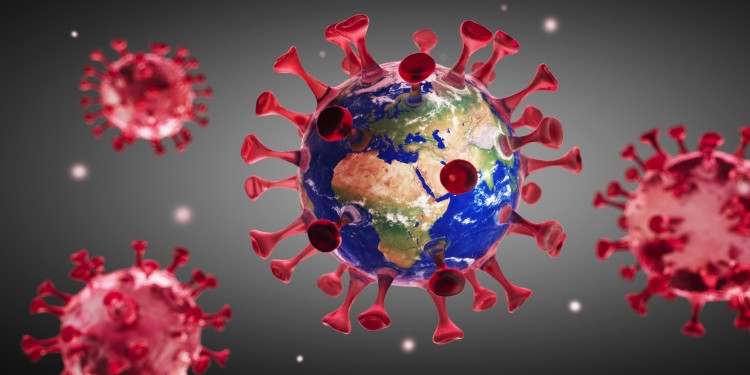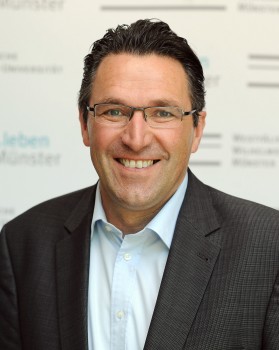
“The current crisis is a kind of test case”
The number of people infected by the coronavirus is decreasing, and there is more and more easing of restrictions in public life. In Germany at least, the worst seems to be over. Or is this merely the calm before the next pandemic storm? Prof. Stephan Ludwig is Director of the Institute of Molecular Virology and the local head of the National Zoonoses Research Platform, and Norbert Robers spoke to him about the danger of new epidemics and about the lessons learned from this current crisis.
The corona pandemic is showing us just how dangerous zoonoses are – those diseases which can be transmitted from animals to humans. Other examples are rabies or borreliosis. What makes corona viruses different from or more than dangerous than, for example, rabies viruses?
The transmission path from animals to humans is the same, but the pathogens are different of course. Rabies is not transmitted through the air, but through bites from animals for example. The coronavirus, however, is a respiratory virus and can be transmitted via droplets in the air – and that’s what makes it so pernicious, because the risk of infection is considerably higher as a result.
Has the risk of zoonoses being transmitted increased over the past few years?
Yes, though I wouldn’t yet call it a trend. It has more to do with the fact, in particular, that we’re being more observant.
At the same time, are we talking about a globalization of zoonoses?
Absolutely. They’re spreading mush faster nowadays, as a result for example of the steady increase in air and goods traffic. A virus which starts in China can be in Europe within twelve hours and proliferate here. Animal transports are another possibility. And yet another factor is climate change resulting, for example, in animals’ habitats being moved: in such cases the viruses naturally also migrate along with the animals. This is always especially pernicious when these pathogens are transmitted by so-called vectors. These are intermediate hosts such as ticks and mosquitos which absorb the blood from an infected animal and can then transmit it to us humans. These pathogens spread extremely rapidly whenever the climate changes. At the moment, for example, there are a lot of mosquitos which can transmit malaria.
An American evolutionary biologist says that there is “no biological reason why epidemics should not in future kill several hundred million people and plunge the planet into a decades-long depression”. Is this scaremongering or a real danger?
It’s a possibility. Of course, every current corona-related death is dramatic. But fortunately the current coronavirus is not a highly deadly virus. The mortality rate is under one percent. We could describe the current situation as a kind of test case. Things could indeed become much worse in future.
This doesn’t sound at all good, because it doesn’t look as if we can really halt the growth in population, the enormous mobility, the changed methods of animal breeding and climate change …
That’s true. These dangers are something that we’ll have to live with.
And there’s no way we can counter them?
Yes, there is. For example, and with a view to possible future pandemics, we must pump even more resources into our health system. And we must also step up our monitoring. Nowadays it’s possible to recognize such dangers quickly, and we also have a lot of instruments of global communication.
But we already had all these things a few months ago, when the coronavirus was allegedly transmitted to humans in Wuhan in China.
That’s true. And it shows that we need to greatly intensify both zoonosis research and, at the same time, monitoring activities. In the long run, both of these measures could save humanity a lot of trouble and suffering.
Do you go along with the accusations against China that the country reacted too late and too hesitantly and that it is still trying to hush things up?
These accusations are also made for political purposes, of course – but that’s not my field of work. As I see it, the Chinese have reacted as never before: quickly and radically. It was different with the first outbreak of coronavirus in 2002, for example, when they tried to keep everything covered up. Having said that, there were and are considerable shortcomings in communication. We repeatedly need to be aware that any policy of disinformation greatly facilitates the spread of the virus.
There are those who say that a ban on wild animal markets would provide the most important opportunity for preventing zoonoses. So the solution is as simple as that?
I do at least go along with the theory that such markets are indeed dangerous, in that a pathogen can be transmitted to a human faster there than elsewhere. We saw that in Hong Kong, for example, where all the poultry markets were closed down after the outbreak of bird flu – and that solved the problem. The big problem is that such markets are a part of many countries’ culture. And they are an important source of food and income for millions of people. It might help if food preservation were at least improved.
Do we also need to rethink our relationship to animals (pets)?
Yes, we do. Although it’s never led to the spread of any major disease here in Germany, there was for example the case of pet rats transmitting smallpox viruses. At the very least we should think again about the growing tendency to treat animals as humans, for example by allowing them into our beds.
We have all started to think about the lessons we should learn from this current pandemic. What lessons do you think politicians should learn?
First of all, let me just say that our politicians have done a very good job so far. Firstly, they should continue to listen to the experts, as in any crisis. Secondly, the plans for the pandemic should be revised quickly. And lastly, looking to the future, they should think about how to improve for example the supply of facemasks and field hospitals within a short space of time.
And what lessons should business be learning?
The last point I made applies to business, too, which evidently has no Plan B at the moment as regards sourcing certain materials.

Each and every one of us can think about whether – for example, in the case of meat – we always have to have the cheapest product. Because it is precisely this attitude which leads to the ways animals are currently kept and exported, and this in turn facilitates the spread of viruses.
And should we all, in the long term, give up shaking hands and hugging each other, think long and hard about our behaviour as regards hygiene – and change it?
I rather fear that most people will revert to old patterns of behaviour, the further we move on from the crisis. And, of course, shaking hands and hugging someone when we meet them are also part of our culture. It would certainly be beneficial if, in the long term, we could at least stick to certain things: keeping our distance when we cough or sneeze, not touching our faces so often, and washing our hands thoroughly. That’s certainly something that all virologists would welcome.
This article was first published in the University newspaper wissen|leben No. 4, 17 June 2020.
